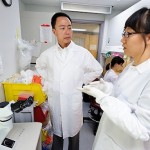Tag Research
Eavesdropping plants prepare to be attacked
In a world full of hungry predators, prey animals must be constantly vigilant to avoid getting eaten. But plants face a particular challenge when it comes to defending themselves. Read More
UW institute announces National Poverty Fellows Program
A new National Poverty Fellows Program, administered at the University of Wisconsin–Madison, will launch a search this fall for talented postdoctoral researchers to participate in a partnership to build capacity to conduct high-quality, policy-relevant research on poverty and inequality in the United States. Read More
Seminar explores role of proteins in health and disease
The Human Proteomics Program at UW–Madison and the BioPharmaceutical Technology Center Institute on Aug. 1 will present the Wisconsin Human Proteomics Symposium: Targeted Proteomics and Systems Biology in Health and Disease. Read More
Protecting our Pollinators
Bees, so crucial to our food supply, are dying off at alarming rates. CALS researchers are taking a close look at everything from the microbes in their hives to the landscapes they live in to identify in what conditions bees thrive. Read More
In a sea of data, Bioinformatics Resource Center rides genomic wave
In July 2012, the UW–Madison Bioinformatics Resource Center opened for business, providing one-stop shopping for genetic sequencing, genome assembly, analysis and a host of services to help UW–Madison faculty and others make sense of the sea of data generated by new technologies that have put the secrets of human, plant, animal and microbial genomes within tantalizing reach. Read More
Waisman scientists model human disease in stem cells
Many scientists use animals to model human diseases. Mice can be obese or display symptoms of Parkinson's disease. Rats get Alzheimer's and diabetes. But animal models are seldom perfect, and so scientists are looking at a relatively new type of stem cell, called the induced pluripotent stem cell (iPS cell), that can be grown into specialized cells that become useful models for human disease. Read More
Exploring a volcano: The romance and the reality
A UW–Madison team endures hardship in the field, where a deceptively calm volcanic site could be spewing lava within weeks. Read More















